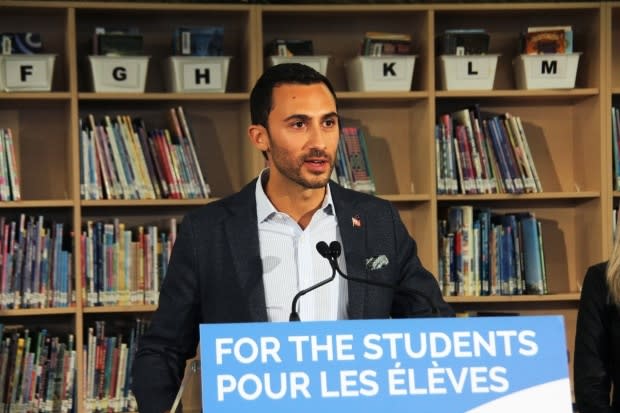We're part of rotating strikes too, say support staff
Friday may have marked the largest walkout by Ontario education workers in 20 years, but it wasn't just teachers on the picket lines.
Richard Brown, chief custodian at Cairine Wilson Secondary School in Orléans, said school support workers are often overshadowed by their teacher colleagues when it comes to conversations about the strikes.
Education workers and support staff, in fact, make up more than a quarter of the people holding signs for the Ontario Secondary School Teachers' Federation (OSSTF).
"I have a lot of colleagues that [only] make $14 an hour," Brown told Ottawa Morning Friday.
The teachers' unions are asking for approximately two per cent in annual salary increases. Little progress has been made, however, with the provincial government refusing to give more than a one per cent increase.
The Elementary Teachers' Federation of Ontario (ETFO) last met with the province in late January, and the OSSTF hasn't negotiated with the province since December.
The Ontario English Catholic Teachers' Association (OECTA) and the French public teachers' union, however, are actively bargaining with the province and met with negotiators Thursday.

Fluctuating class sizes
As a support worker, Brown said he often feels like a father to the students — helping them fix their bike chains and even taping one child's destroyed shoes back together.
He said anyone who believes educational workers are adequately compensated should spend more time in a school, especially with custodial or maintenance staff.
"The two per cent, it's going to make a little bit of a difference," Brown said. "Hopefully it helps offset the costs to increase food and housing."
Class sizes have also been an issue during the negotiations, with Ontario's ministry of education initially announcing plans to increase maximum class sizes from 22 students to 28. The province partially walked back that decision in October, lowering the maximum to 25 students.
Connie Allen, a speech language pathologist at Manotick Public School and W.E. Gowling Public School, fears a change in class sizes could affect the level of care she provides.
Allen said if workers like herself aren't able to help students early enough, it can lead to long-lasting delays in their education.
"I think all of us deserve a cost-of-living increase, but we've already given up more in wages than what we'll get back in that increase," Allen said.
"This really isn't about compensation for us. This is about guaranteeing that students in our school board and across the province receive the support they need in the environments where they are."
Allen said the services her colleagues provide are among the first to be cut when governments look to pare back.
She also warned that support workers have options to work elsewhere.
"We are not as well compensated as we perhaps should be," Allen said. "People are leaving because our services are in demand elsewhere. For example, there are mental health demands in the post-secondary system."

In a statement to CBC News, Education Minister Stephen Lecce wrote that the province would "remain squarely focused on providing stability to students who face escalation by teacher unions."
"We have demonstrated this focus on students during the negotiation process, by advancing educational priorities that matter: merit-based hiring, enhanced investments in student priorities and special education over union demands for more generous wages and benefits and committed — in writing — to protecting all-day kindergarten," Lecce wrote.
His statement did not specifically mention school support staff.


